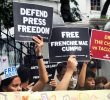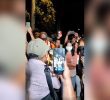By Raissa Marfa
As a shared experience with fellow women, stitching for me has always been an avenue to release my frustrations and other unwanted emotions. During this pandemic, this practice has saved me from the lingering confusion with myself, and from the harshness and disharmony with the society. It has helped me reflect and make sense of what is happening within me and around me.
Given the rising number of COVID-19 cases this month of March, some activities in celebration of the International Women’s Month have been cancelled, postponed or adjusted. One of the activities affected is the Garage Sale for the Southern Tagalog defenders by the Rural Women Advocates and Gantala Press – initially to be done physically. On March 20, instead of physically selling our hand-stitched products, we had to make use of our online platforms to do so. The online Garage Sale aimed to raise funds for the families of the slain activists of Bloody Sunday, financial aid for Laguna 5, and farmers and peasant women of Quezon and Yulo who are experiencing militarization and harassment.
Hands that Struggle
I had about a week to prepare the clothes with hand-stitched palay and isda, and hand-stitched phrases as a call for genuine land reform, as well as a call for the government’s accountability on state terrorism.
Every stitch is meaningful as it constitutes the bigger picture. Over time, I learned the importance of pacing in stitching – not too slow, not too rushed – to savor each push-and-pull of the needle, to do each stitch properly. From time to time, I find myself resting after a few stitches.
As I continued stitching, I wondered: What must have their hands felt during that unfortunate Sunday? What struggles did the hands of Puroy Dela Cruz and Randy Dela Cruz of the indigenous Dumagat tribe experience that day? When they were tired with all the push-and-pulls between them and their perpetrators, were they even allowed to rest? As I continued stitching, almost finishing a piece, I wondered: Was the death of Emmanuel “Manny” Asuncion of Bagong Alyansang Makabayan-Cavite part of the bigger picture of the “Kill, kill, kill” order?
As I finished one piece after another, I felt a sense of responsibility to stitch more. I felt like every stitch corresponds to a peso that may help the slain activists’ bereaved families for funeral assistance or any assistance they might need in their call for justice. As we sold one hand-stitched piece after another, and received donations for the families of our Southern Tagalog defenders, I felt a sense of hope – the stories of our Southern Tagalog human rights defenders are being heard more.
The Common Ground
Stitching for the cause of raising funds for the slain activists of Bloody Sunday brought a lot of emotions to me for the past few days and weeks. Being in the comfort of my home during the pandemic at times brings much frustration. What can I do? Will my actions even matter? How do I make myself relevant and useful in times of resistance and call for justice for these slain victims?
Stitching answered all these questions. Resisting and calling for justice, I realized, always come in different forms, and any form is acceptable and appreciated. Creating something with my own hands translated to accepting the responsibility to continue the fight of our slain activists. Every push-and-pull of my needle also represents the resistance, the pain and despair of human rights defenders and their bereaved families.
More than the healing I feel whenever I stitch for a cause, it is always my hope that through my stitching, the individuals who continue to defend human rights, and their families will also feel the same sense of healing, consolation and hope. This experience has brought a common ground for all of us – our hands will continue to work until hope is instilled to each one of us, and until justice is rightly served.
For donations and to volunteer with the Rural Women Advocates (RUWA), visit RUWA’s Facebook page (https://www.facebook.com/





![[ANALYSIS] A different drug war](https://davaotoday.com/wp-content/uploads/2024/09/1000019103-110x100.png)




